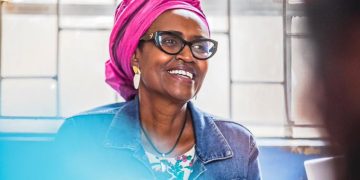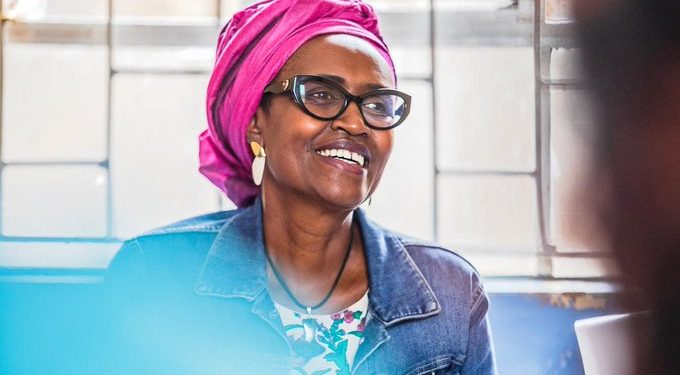“In a pandemic, sharing technology is life or death. And we are choosing death,” UNAIDS executive director, Winnie Byanyima, has said.
She was speaking during the World Trade Organization (WTO) 12th Ministerial Conference in Geneva on June 12-15 on Wednesday.
According to her, continuous obstruction by rich countries has left billions of people without access to Covid-19 vaccines and treatments hence undermining efforts being made to end the pandemic worldwide.
“Money cannot be prioritized over saving lives. What’s at stake is beyond just this pandemic,” emphasized Byanyima who was flanked by Nobel Prize-winning economist, Joseph Stiglitz.
“Rich countries have an opportunity to do the right thing. In the coming few weeks, I implore them to put people ahead of profits,” she told the press in Geneva.
She said hoarding the rights and recipes to life-saving, pandemic-ending medicines means letting people die, letting the pandemic struggle on, endangering everyone, and undermining the global economy.
In a pandemic, sharing technology is life or death.
And we are choosing death.
Money cannot be prioritized over saving lives.
What's at stake is beyond just this pandemic.#PeoplesVaccine #EndInequalities #endAIDS pic.twitter.com/tzpoNiThMv
— Winnie Byanyima (@Winnie_Byanyima) June 3, 2022
“It will be difficult for us to live on this planet in a way of collaborating, of solidarity, of give and take to each other if a few rich countries can hold out at the cost of lives in poorer countries. This is not a way to go into the future,” Byanyima told journalists.
Drug companies prioritized profits over human lives
In turn, Stiglitz, a professor at Columbia University, said the drug companies did not want a quick response because the slower the response, the higher the profits they would reap.
“More people died, but that’s not their concern. Their concern was profits over people’s lives,” he pointed out.
According to him, a proposal introduced in October 2020 by India and South Africa at the WTO to temporarily waive a major intellectual property agreement known as TRIPS in an effort to expand vaccine production, is being derailed by rich countries.
What is needed today is a clear, unambiguous #TRIPSwaiver.
Rich nations have an opportunity to do the right thing at @wto negotiations.
I implore them to put people ahead of profits.
w/@JosephEStiglitz @_HassanF @PSIglobalunion@SABCNews @PeoplesVaccinehttps://t.co/JBT1L15WJf
— Winnie Byanyima (@Winnie_Byanyima) June 3, 2022
“The fact that the advanced countries, in Europe in particular, are not willing to put the lives into account of millions of people all over the world has undermined support for globalization and is leading to a more divided world with untold consequences going forward,” he told the media.
Byanyima concurred that patent waiver negotiations should have been simple in the middle of a pandemic, when people are dying, to ensure that governments can take steps to protect public health, without WTO rules coming in the way.
“And it should have happened long ago. Instead, negotiation has been derailed by a number of rich countries,” she noted.
Inequalities are a political choice
While addressing the first Arab Forum for Equality, held in Amman on 30-31 May 2022, Byanyima shared the lesson she has learnt about inequality.
“The first lesson is a worrying one: that inequality which was already extreme is being exacerbated even further. In 2022, nearly half of humanity, 3.3 billion people are projected to be living below the poverty line of 5.50 USD a day. New Oxfam estimates show that over a quarter of a billion more people could be pushed into extreme poverty in 2022.”
She said a new billionaire has been created every 26 hours since the pandemic began and the world’s ten richest men have seen their fortunes double.
A year and a half since the first doses of a COVID vaccine were delivered, 78% of people in the US are fully vaccinated, 69 % in Europe but still under 50% (46.26%) of people in the Arab region, Byanyima explained.
“We also see huge inequalities within the Arab region. United Arab Emirates has reached 97% Covid vaccination. But it is a health emergency that Algeria is only at 15 % and Yemen at just 2.2%. Since the onset of COVID19, wealth inequality has considerable increased in the Arab region, with the richest 10% of the population now controlling more than 80% of total regional wealth.”
"Inequality is a crisis but it is not fate, tackling it is within our hands," @Winnie_Byanyima at Arab #EqualityForum2022 https://t.co/w2FIw0a9LZ pic.twitter.com/vfJXwGqRPS
— UNAIDS (@UNAIDS) May 30, 2022
“The second lesson is even more worrying: that we won’t be on track to overcome health or economic crises until inequalities come down.”
She said these kinds of extreme, intersecting, inequalities increase the risks societies face from pandemics such as AIDS and COVID-19.
“And we’ve seen with COVID just how quickly a health crisis is turned by inequalities into becoming a social, a political, an economic crisis.”
The third lesson, according to her, is a hopeful one, but that hope depends on action: inequalities are a political choice.
“Courageous leaders can tackle inequalities. We can close tax loopholes and tax holidays for companies. We can go beyond the 15% tax rate agreement for all corporate taxation around the world, up to 25%. We can ensure taxes are paid where economic activity happens. We can increase investment in health, education and social protection. We can reform laws and policies so that they help us reduce harm and risk, not worsen it.”
She added: “We can change the global trade rules which kept life-saving vaccines locked up in the North. Inequality is a crisis but it is not fate, tackling it is within our hands.”











